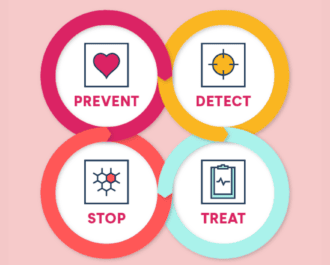
The findings of some exciting breast cancer research were released in February, continuing to give hope to women of better treatments in future. Updates in immunotherapy, chemotherapy and exercise were of particular interest this month.
Metastatic: According to a recent study of 129 women with advanced breast cancer, a blood test designed to identify DNA associated with cancer has correctly predicted that most patients with higher levels of the tumour markers died significantly earlier than those with lower levels. With more research, this finding could pave the way for identifying women at higher risk of recurrence and track the success or failure of treatments.
Immunotherapy: Scientists at the Peter MacCallum Cancer Centre are developing a world-first drug capable of controlling the human immune system and potentially paving the way for thousands of cancer patients to undergo lifesaving immunotherapy. The team is fine tuning a drug which is able to temporarily suspend a person’s immune system to stop it attacking non-cancerous parts of a patient’s body or rejecting bone marrow transplants. This interesting article includes a great explanation of immunotherapy, breast cancer case studies and comments from NBCF-funded Associate Professor Sherene Loi.
Chemotherapy: Historically, the management of women with early-stage breast cancer has been aggressive, but over the last decade, research has shown that not all women benefit from chemotherapy. Women who are identified at low risk of recurrence can already forgo the toxic treatment, and a recent US study is further refining whether women with a medium risk can be spared. More trials are needed but this could result in more women befitting from a ‘less is more’ approach to treating early-stage breast cancer.
NBCF note: In Australia the test for women to see if they can safely avoid chemo is very expensive and the results must be analysed in the US, so it is under-utilised. This year, NBCF funded Dr Belinda Yeo to gather preliminary data on another test, which provides the same information but is considerably cheaper and can be analysed in Australian hospitals, giving more women the information to make the right choice for them.
Exercise: Two studies published recently have determined that exercise is best for reducing breast cancer recurrence. The first study found that regular exercise such as walking significantly reduces the risk of breast cancer recurrence and breast cancer death regardless of diet, and the second study found that walking also increases the quality of life for those with metastatic breast cancer. The lead researcher on this study says “This is a first step towards exploring how walking can help people living with advanced cancer. Walking is a free and accessible form of physical activity, and patients reported that it made a real difference to their quality of life.”
NBCF note: In 2017, NBCF has again funded Professor Marina Reeves who is conducting a pilot study to determine the viability of an exercise and diet program for women with metastatic breast cancer to test whether the program improves women’s quality of life, wellbeing and physical health. Findings from her study will then inform a larger research study and ultimately public health guidelines to support for women with metastatic breast cancer, improving their routine cancer care in the future.
More News Articles
View all News


